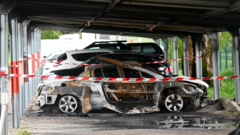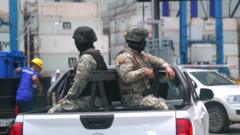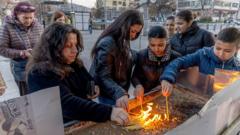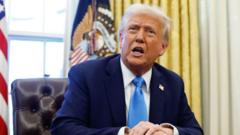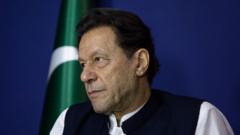French jails have experienced a surge of violence, with coordinated arson and gun assaults believed to be orchestrated by drug gangs in response to government crackdowns.
**French Prisons Under Siege: Are Drug Gangs Behind the Rising Violence?**
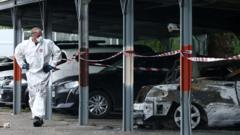
**French Prisons Under Siege: Are Drug Gangs Behind the Rising Violence?**
A series of violent attacks on French prisons has sparked speculation about the motivations behind them.
In recent nights, French prisons have been ablaze from multiple coordinated attacks, escalating concerns about the influence of drug syndicates. The onslaught, which included incendiary actions and armed threats, has drawn attention to a possible retaliation against the government's intensified fight against drug trafficking.
Interior Minister Bruno Retailleau voiced his concerns, identifying the culprits as "drugs-yobs," emphasizing that the state's efforts to clamp down on their operations have prompted aggressive responses. Reports indicate that car fires were deliberately started around jails in synchronized attacks, which were further taunted by graffiti referencing a newly emerged group advocating for inmates' rights — the DDPF, or Rights for French Prison Inmates.
The DDPF has released videos showcasing the violence, undermining the traditional image of a typical far-left or anarchist organization. Instead of intellectual discourse, the group's narrative is characterized by poor grammar and spelling, hinting at its roots in the underworld rather than academia. This has led investigators to speculate that the attacks bear the hallmarks of drug gangs defending their territory rather than a coherent political movement.
Amidst the fear of foreign influence, particularly from countries like Russia or Algeria, the focus remains on the motivations of the drug networks. The French government, now steered by a rare alignment of right-wing justice and interior ministers, is aggressively pushing legislation aimed at dismantling drug trafficking networks. This includes plans for new top-security prisons that will house the most dangerous offenders, in a bid to cut off the lines of communication and operations run from behind bars.
As the authorities seek to quell the unrest caused by these violent incidents, the overarching narrative indicates that the government believes it is making strides against drug violence, which is expected to resonate with their voter base. Investigators are on the hunt for perpetrators of these attacks, offering a glimpse into an intensified battle between state forces and drug criminals in France.
Interior Minister Bruno Retailleau voiced his concerns, identifying the culprits as "drugs-yobs," emphasizing that the state's efforts to clamp down on their operations have prompted aggressive responses. Reports indicate that car fires were deliberately started around jails in synchronized attacks, which were further taunted by graffiti referencing a newly emerged group advocating for inmates' rights — the DDPF, or Rights for French Prison Inmates.
The DDPF has released videos showcasing the violence, undermining the traditional image of a typical far-left or anarchist organization. Instead of intellectual discourse, the group's narrative is characterized by poor grammar and spelling, hinting at its roots in the underworld rather than academia. This has led investigators to speculate that the attacks bear the hallmarks of drug gangs defending their territory rather than a coherent political movement.
Amidst the fear of foreign influence, particularly from countries like Russia or Algeria, the focus remains on the motivations of the drug networks. The French government, now steered by a rare alignment of right-wing justice and interior ministers, is aggressively pushing legislation aimed at dismantling drug trafficking networks. This includes plans for new top-security prisons that will house the most dangerous offenders, in a bid to cut off the lines of communication and operations run from behind bars.
As the authorities seek to quell the unrest caused by these violent incidents, the overarching narrative indicates that the government believes it is making strides against drug violence, which is expected to resonate with their voter base. Investigators are on the hunt for perpetrators of these attacks, offering a glimpse into an intensified battle between state forces and drug criminals in France.


